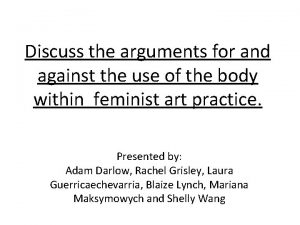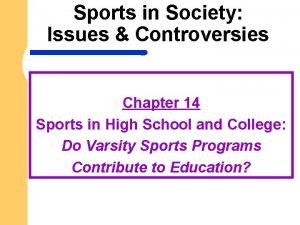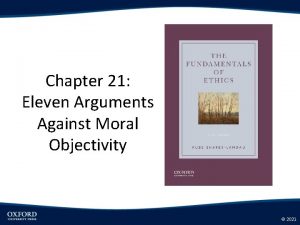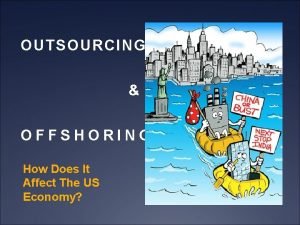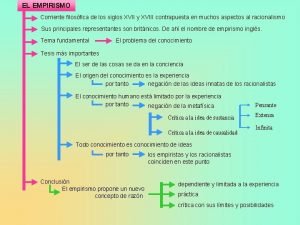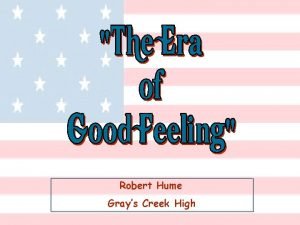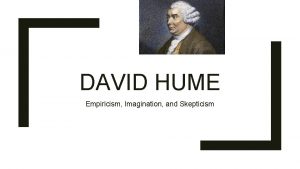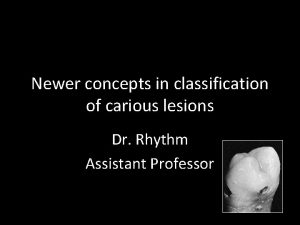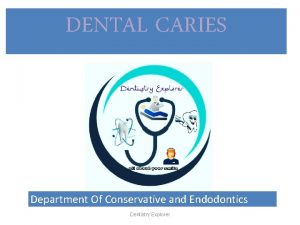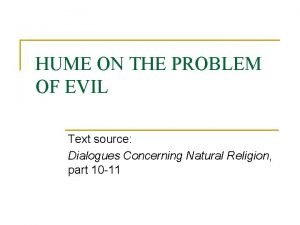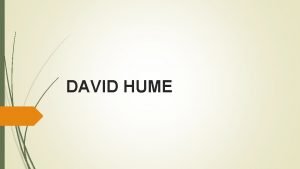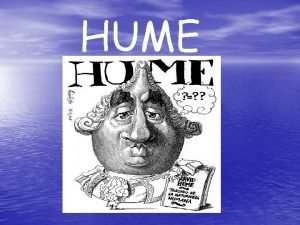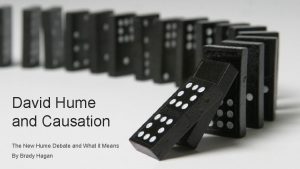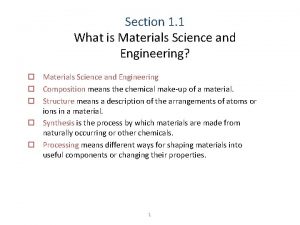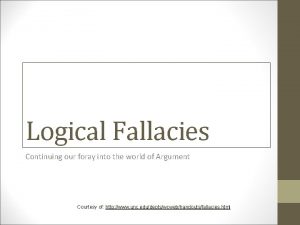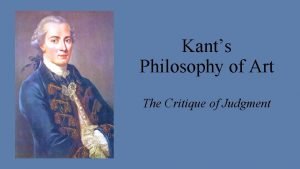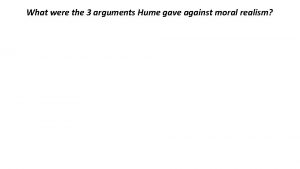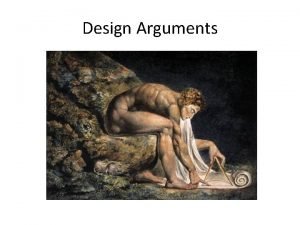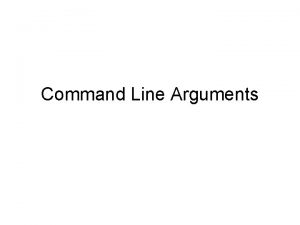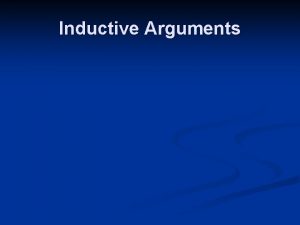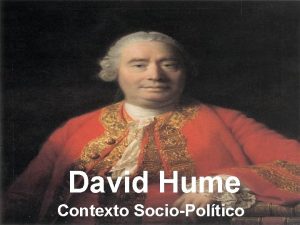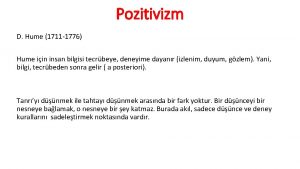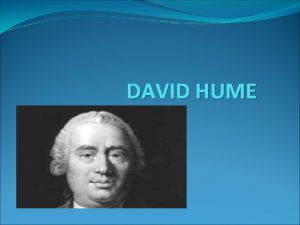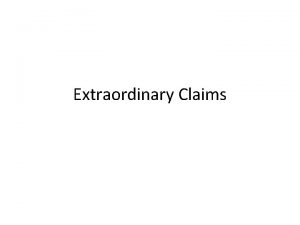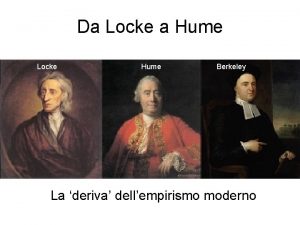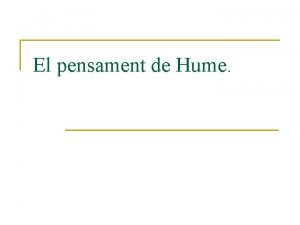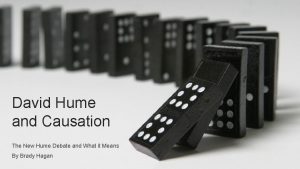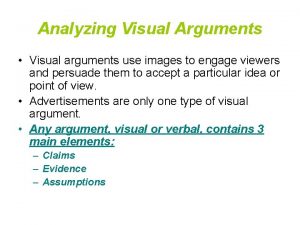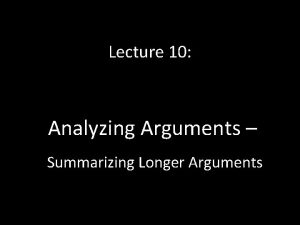What were the 3 arguments Hume gave against





























- Slides: 29

What were the 3 arguments Hume gave against moral realism?

Draw a diagram to highlight similarities and differences between ethical naturalism and non-naturalism Non. Naturalism

Non. Naturalism Similarities

The week for scorpios! “This week, as Mars and Pluto 'station', Pluto squares Venus and we approach a Full Moon in Scorpio, you will help yourself most if you stick with the obvious. Right now, Mars and Pluto are standing still in the sky at the same time. The challenge in that is to conquer a fear of being beaten by a bigger power. ” 1. Are these statements truth-apt (are we using them as if they express truth)? 2. Are they actually true, or false? 3. Why?

Error Theory 1. Mackie argues that all realists, not just intuitionists but naturalists as well are committed to the existence of objective moral values. Kant believed there exists a categorical imperative; Aristotle believed the good lay in eudaimonia which was intrinsically desirable; Mill and the utilitarians believed that the good lies in happiness etc. 2. We also have a habit, even when talking about morality in normal everyday language, to make a claim to objectivity. “X is just wrong, it just is. ” 3. But these approaches are in error. We claim to know about properties that don’t actually exist. There are no objective moral properties. Thus our statements about them (no matter what they say) are always false.

Error Theory - Summarised 1. Some statements have truth-value: they aim for objectivity (they aim to express a view about something mind-independent & ‘out there’ in the world). 2. However there is no such reality! 3. Therefore the statement is always false. Mackie thinks this is what is going on when people make moral judgements. NB: You will see a similar claim when we discuss non-cognitivist claims about morality. The difference is that whilst non-cognitivists believe we are making a mistake in our understanding of how moral terms work, Mackie is saying we are making an error by referring to something ‘out there in the world’ that doesn’t actually exist. It is an ontological error, not an linguistic one.

• Write 2 sentences to explain why Mackie’s error theory is a cognitivist, anti-realist theory. • How do you think he justifies his theory?

• How does Mackie justify the claim in premise 2: that there is no such moral reality? . . .

1. The argument from relativity Are these cultural events morally right or wrong? Can we definitively say?

1. The argument from relativity • Moral values vary depending on society, place and time. • Our moral values are thus determined by where and how we were raised rather than by any external ‘fact’. • Moral judgements actually refer to our perception of social norms (norms = normal way of things). • There are therefore no objective moral values. This means any attempts we make at objective claims are automatically false. Objective: Mind-independent and existing as part of ‘the fabric of the world’

2. The argument from epistemological queerness What faculties do we have that allow us to detect what is right and wrong in the world?

2. The argument from epistemological queerness Epistemological queerness • Realists (particularly intuitionists) claim that there are special moral entities, and that we know them through a special faculty unlike the rest of our senses. • This is an odd thing to claim! • What or where are they? And how exactly do we perceive them if not through our senses? • There does not seem to be any adequate answers. • It is therefore better to say that there are no objective moral properties, and we don’t know categorically that things are wrong or right.

3. The argument from metaphysical queerness What kinds of things might make us carry out a particular action?

3. The argument from metaphysical queerness Might any of these things motivate you to act? If so, why? The fact this tomato is red The fact that this ice is cold The fact that this car is expensive The fact this man has robbed a bank

3. The argument from metaphysical queerness • We are used to desires, wants and needs motivating us to act. These things are personal and subjective, they differ from me to you. • We are NOT used to objective facts about the world motivating us to act in a particular way. Facts like “That is a red tomato” do not have any intrinsic motivation, they just are the case. • If morals are truly objective, then that suggests they are unlike anything else in the universe – since simply knowing what is ‘good’ or ‘bad’ in a particular situation would be enough to motivate us to act. This motivation would be independent of our desires or feelings. No other objective fact about the universe does this. • If this is a confusing idea, that’s Mackies point. How could an objective property motivate us in this way? How could there be some direct, immediate connection between a fact about the world and our desires? Just to know something true about the way the world is doesn’t entail being motivated to do anything about it. It just seems odd.

Wow, I’m hungry. I just have to eat a banana Wow, I just have to help them!

Conclusion: • Moral properties seem odd because they don’t actually exist! • We are motivated by moral judgements – but this is psychological: e. g. We want to be accepted by our society so we follow the moral terms they set down.

Recap – Whiteboards… What reasons does Mackie give for thinking its wrong to claim that there is objective moral truth?

Summary: • Mackie was an anti-realist insofar as he rejected the claim that there are objective moral facts about the universe. • But he was a cognitivist in that he thought ethical language was directed towards the world and attempting to describe the world. • He just thought all attempts to do this failed and were false. • His argument from relativityy and argument from queerness were intended to show that there are no objective moral facts. • Argument from Relativity – Shows morals are relative and very much depend on us. • Argument from Metaphysical / Epistemological Queerness – Shows morals are weird, they motivate us in a way that no other objective facts do and we’d have to have some weird extra capacity in order to access them that we’ve not discovered yet. Surely it’s just easier to say they don’t exist?

On whiteboards • What are the strengths of Mackie’s error theory? (of the 3 arguments, which do you find most convincing? Why? ) • What are the weaknesses?

Criticism – Mental NOT Physical States • • Moral properties are not ‘part of the fabric of the world’ in a physical sense But they might still exist… How might they exist? They may exist in a psychological sense: E. g. Whether someone is in pain or feels happy is a fact about the world, it’s just one that is connected to us directly. Therefore moral judgements based on this would also be facts connected to us directly. • It is not ‘mind-independent’, but it is real. • And it is a mind-independent fact that people do feel pain, feel happy etc. • So perhaps moral facts are facts about our minds, part of our understanding – and not queer at all!

• Are moral judgements like horoscopes – they relate to something that doesn’t actually exist? • Are psychological facts part of reality? • Is Mackie right that moral statements can be true or false? • Is he right that there is no moral truth?

Task • Use your notes from the past few weeks to read carefully through the ‘cognitivism’ handout and highlight / annotate any important information. • You should also use this time to fill in any gaps or areas you’ve missed from this topic. Make sure you understand: • Cognitive / Non-Cognitive / Realism/ Anti-Realism • Naturalistic Ethics • Mills argument for UT • Weaknesses • Non-Naturalism • Moores Open Question Argument • Weaknesses • Error Theory • Argument from Subjectivity • Argument from Epistemological / Metaphysical Queerness • Weaknesses

Mini-Test What is the difference between cognitivism and non-cognitivism in ethics? What is the difference between realism and anti-realism in ethics? What do naturalists believe about ethical language? Outline Moore’s open question argument for non-naturalism. Outline the argument from epistemological queerness for error theory.

Key Terms - For your notes: Cognitivism • Cognitivism in ethics is the view that moral judgements are propositions which are ‘truthapt’– they are statements that can be considered true or false. Non-cognitivism • Non-cognitivism is the view that ethical sentences do not express propositions (statements) so therefore they cannot be true or false.

Key Terms 2 - For your notes: Moral realism • Moral realists believe that in some sense moral terms refer to something real in the world, for example pleasure, or happiness, or utility, or the moral law or God’s command. So, from a realist position, moral laws can be discovered. Moral anti-realism • Moral anti-realists believe that moral terms do not refer to anything real or the in world, but are something else entirely – for example your personal attitude towards something. In this sense then, moral laws are not something we can discover in the world.

Naturalism: Reductionism Ethical Naturalism is a form of reductionism. It claims that the things in one domain – moral properties of goodness and rightness – are identical with some of the things in the other domain – certain natural properties. The most plausible natural properties are certain psychological properties.

The open question argument: 1. If good was really e. g. pleasure, then it would not make sense to ask whether pleasure really was good. 2. It does make sense to ask whether pleasure really is good 3. Therefore good is not pleasure. 4. The same is true for any definition we give of good C: Therefore good is indefinable

2. The argument from epistemological queerness Epistemological queerness • Realists (particularly intuitionists) claim that there are special moral entities, and that we know them through a special faculty unlike the rest of our sense. • This is an odd thing to claim! • What or where are they? And how exactly do we perceive them if not through our senses? • There are no adequate answers. • It is therefore better to say that there are no objective moral properties, and we don’t know categorically that things are wrong or right.
 Arguments against art
Arguments against art Secular arguments against abortion
Secular arguments against abortion Difference between emotivism and prescriptivism
Difference between emotivism and prescriptivism Popular arguments for and against interscholastic sports
Popular arguments for and against interscholastic sports Eleven arguments against moral objectivity
Eleven arguments against moral objectivity How outsourcing affects us economy
How outsourcing affects us economy What is the red scare
What is the red scare Metodo inductivo hume
Metodo inductivo hume Hume city library
Hume city library Hume rothery rules
Hume rothery rules Election of 1824
Election of 1824 Empiricism
Empiricism Fallácia
Fallácia Kritik david hume terhadap merkantilisme
Kritik david hume terhadap merkantilisme Ekip çalışması için gerekli yönetsel koşullar
Ekip çalışması için gerekli yönetsel koşullar Mount and hume classification
Mount and hume classification Rory hume
Rory hume Hume rothery rules
Hume rothery rules Millers liquefaction foci
Millers liquefaction foci Smooth surface caries histology
Smooth surface caries histology Escepticismo de hume
Escepticismo de hume Backward caries definition
Backward caries definition Klasyfikacja próchnicy wg blacka
Klasyfikacja próchnicy wg blacka Problem of evil hume
Problem of evil hume David hume nationality
David hume nationality Hume
Hume David hume naturalism
David hume naturalism Hume rothery ratio
Hume rothery ratio Appeal to pity fallacy
Appeal to pity fallacy Art as disinterested judgment
Art as disinterested judgment
